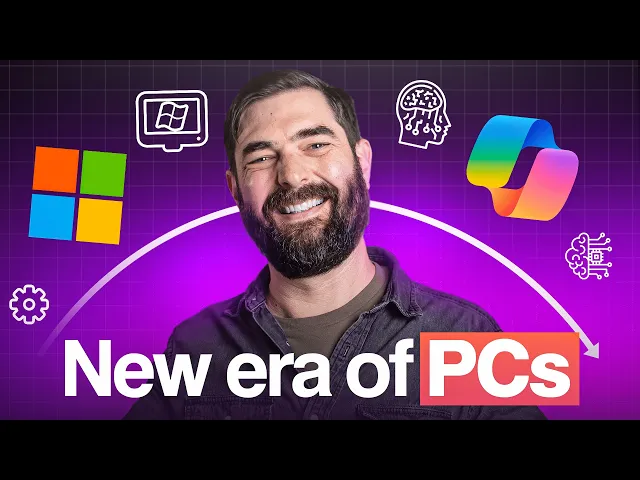Microsoft VP Explains AI PCs + Satya Nadella on Healthcare AI

AI PCs transform business productivity
Microsoft's recent unveiling of AI PCs marks a significant shift in how we'll interact with computing devices in the workplace. During a recent discussion, Microsoft executives outlined their vision for how these AI-enhanced systems will fundamentally change productivity, with implications stretching from everyday workflows to specialized fields like healthcare. This isn't just another incremental hardware update—it represents a fundamental rethinking of the PC's role in our professional lives.
Key Points
-
AI PCs introduce a new computing paradigm with neural processing units (NPUs) that handle AI workloads locally, enabling more responsive, private, and powerful experiences without constant cloud dependence.
-
Microsoft has redesigned core productivity applications like Office to leverage AI capabilities, creating more intuitive interfaces that understand context and can generate content based on natural language prompts.
-
Healthcare stands as a prime example of an industry that will be transformed by AI PCs, with potential to dramatically reduce administrative burdens for clinicians while improving patient care through better data analysis.
-
The shift to AI PCs represents both a hardware and software evolution, requiring tight integration between chip manufacturers, device makers, and application developers to deliver meaningful benefits.
-
Microsoft believes AI capabilities will fundamentally alter user expectations, making traditional computing experiences feel outdated and limited by comparison.
The Business Impact of AI-Native Computing
The most compelling insight from Microsoft's presentation is how AI PCs will transform not just what we can do with computers, but how we interact with them. The introduction of NPUs—specialized chips designed specifically for AI workloads—enables a level of computing that simply wasn't possible on traditional systems. This isn't merely about faster performance; it's about creating entirely new capabilities.
This matters immensely in the business context because it addresses the fundamental friction points that limit productivity today. Consider how much time knowledge workers spend searching for information, formatting documents, preparing presentations, or extracting insights from data. AI PCs promise to eliminate these pain points through contextual awareness and natural language processing that happens locally on the device.
The implications for businesses extend beyond individual productivity gains. As AI PCs become widespread, organizations will need to rethink workflows, training programs, and even job descriptions. Companies that effectively leverage these new capabilities will likely establish significant competitive advantages through improved efficiency, creativity, and decision-making
Recent Videos
How To Earn MONEY With Images (No Bullsh*t)
Smart earnings from your image collection In today's digital economy, passive income streams have become increasingly accessible to creators with various skill sets. A recent YouTube video cuts through the hype to explore legitimate ways photographers, designers, and even casual smartphone users can monetize their image collections. The strategies outlined don't rely on unrealistic promises or complicated schemes—instead, they focus on established marketplaces with proven revenue potential for image creators. Key Points Stock photography platforms like Shutterstock, Adobe Stock, and Getty Images remain viable income sources when you understand their specific requirements and optimize your submissions accordingly. Specialized marketplaces focusing...
Oct 3, 2025New SHAPE SHIFTING AI Robot Is Freaking People Out
Liquid robots will change everything In the quiet labs of Carnegie Mellon University, scientists have created something that feels plucked from science fiction—a magnetic slime robot that can transform between liquid and solid states, slipping through tight spaces before reassembling on the other side. This technology, showcased in a recent YouTube video, represents a significant leap beyond traditional robotics into a realm where machines mimic not just animal movements, but their fundamental physical properties. While the internet might be buzzing with dystopian concerns about "shape-shifting terminators," the reality offers far more promising applications that could revolutionize medicine, rescue operations, and...
Oct 3, 2025How To Do Homeless AI Tiktok Trend (Tiktok Homeless AI Tutorial)
AI homeless trend raises ethical concerns In an era where social media trends evolve faster than we can comprehend them, TikTok's "homeless AI" trend has sparked both creative engagement and serious ethical questions. The trend, which involves using AI to transform ordinary photos into images depicting homelessness, has rapidly gained traction across the platform, with creators eagerly jumping on board to showcase their digital transformations. While the technical process is relatively straightforward, the implications of digitally "becoming homeless" for entertainment deserve careful consideration. The video tutorial provides a step-by-step guide on creating these AI-generated images, explaining how users can transform...
